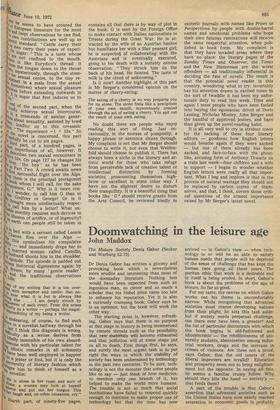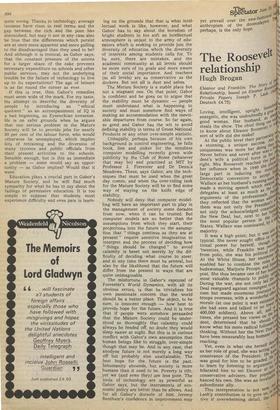Doomwatching in the leisure age
John Maddox
The Mature Society Denis Gabor (Seeker and Warburg £2.75) Dr Denis Gabor has written a gloomy and provoking book which is nevertheless more erudite and interesting than most of the doomsday literature. Nothing less would have been expected from such an ingenious man, so clever and so much a scholar that his Nobel prize came too late to enhance his reputation. Yet it is also a curiously cramping book: Gabor says he is an optimist, but the book will work the other way.
The starting point is, however, refreshing. Gabor says that there is no purpose at this stage in history in being mesmerised by remote threats such as the possibility that raw materials will become exhausted and that pollution will at some stage put us all to death. First things first, he says, and surely the most urgent task is to put right the ways in which the stability of society has been undermined by technology in the past two centuries. To be sure, technology is not the monster that some people like to say — just think of how medicine, to mention only one branch of it, has helped to make the world more humane. The trouble is not so much that social institutions have failed to respond quickly enough to continue to make proper use of technology but that the time has now arrived — in Gabor's view — when technology is or will be so able to satisfy human needs that people will be deprived of the sense of challenge that has kept the human race going all these years. The puritan ethic that work is a desirable end in itself is being eroded. In short, Gabor's book is about the problems of the age of leisure. So far so good.
For my taste, the canvas on which Gabor works out his theme is uncomfortably narrow. While recognising that advanced societies must rescue developing nations from their plight, he sets this task aside: but if society needs perpetual challenge, can there ever have been a greater? And the list of particular discontents with which the book begins is old-fashioned and idiosyncratic — the rebelliousness of university students, absenteeism among industrial workers, drugs and the increase in crimes of violence. Are these not a proof, says Gabor, that the old tenets of the liberal improvers are invalid? Education and prosperity seem not to bring enlightenment but the opposite. In saying all this, he seems a familiar crusty fellow. Why should they bite the hand — society's — that feeds them?
A part of the trouble is that Gabor's assertion that advanced societies such as the United States have now nearly reached saturation in economic goods is probably quite wrong. Thanks to technology, average incomes have risen in real terms and the gap between the rich and the poor has diminished, but may it not in any case also be true that the differences which persist are at once more apparent and more galling to the disadvantaged than they used to be? And although it is ironical, as Gabor says, that the constant pressure of the unions for a larger share of the cake prevents necessary expenditure on schools and other public services, may not the underlying trouble be the failure of technology to live up to its expectations? The age of leisure is as far round the corner as ever.
If this is true, then Gabor's remedies must seem wide of the mark. For my taste, his attempt to describe the diversity of people by introducing an "ethical quotient" as an accompaniment of IQ is a bad beginning, an Eysenckian nonsense. He is on safer grounds when he argues that one serious problem in the Mature Society will be to provide jobs for nearly 30 per cent of the labour force, who would otherwise be unemployed, which implies lots of retraining and the diversion of many tycoons and public officials from their present activities to the schools. Sensible enough, but is this as immediate a problem — some would say an opportunity — as Gabor implies? Would that it were. • Education plays a crucial part in Gabor's Mature Society, and he will find much sympathy for what he has to say about the failings of permissive education. It is too simple to suppose that students must experience difficulty and even pain in learn ing on the grounds that that is what intel lectual work is like, however, and what Gabor has to say about the boredom of bright students in too soft an intellectual atmosphere is unjust to the army of educators which is seeking to provide just the diversity of education which the diversity of interests among students calls for. To be sure, there are mistakes, and the academic community at all levels should be more sure of its goals and more aware of their social importance. And teachers (at all levels) are as conservative as the dockers. But not all is dust and ashes.
The Mature Society is a stable place but not a stagnant one. On that point, Gabor is confident and he goes on to argue that the stability must be dynamic — people must understand what is happening to society and must somehow find ways of making an accommodation with the inevitable departures from course. So far again, so good and Gabor has the wit to avoid defining stability in terms of Gross National Products or any other over-simple statistic. Unhappily, perhaps because of his own background in control engineering, he falls hook, line and sinker for the mindless computer modelling recently given wide publicity by the Club of Rome (whatever that may be) and practised at MIT by Professor J. Forrester and Dr Dennis Meadows. These, says Gabor, are the techniques that must be used when the great day comes, and when the over-riding task for the Mature Society will be to find some way of staying on the knife edge of stability.
Nobody will deny that computer modelling will have an important part to play in the management of society some decades from now, when it can be trusted. But computer models are no better than the assumptions from which they start, their projections into the future on the assumption that "things continue as they are at present" require sensitive imagination to interpret and the process of deciding how "things should be changed" to avoid calamity is beset not merely by the dif ficulty of deciding •what course to steer, and at any time there must be several, but also •by the likelihood that the future will differ from the present in ways that are quite unimaginable.
• The misfortune in Gabor's espousal of Forrester's World Dynamics, with all its obvious errors, is that he trivialises his own passionate concern that the world should be a better place. The object, to be sure, is innocent enough — how best to provide hope for the future. And it is true that if 'people were somehow persuaded that the Mature Society could be under stood so thoroughly that calamity could always be fended off, no doubt they would sleep easier at night. But this is in curious conflict with Gabor's own assumption that human beings like to struggle, over-simple though that may be. And in any, case, that anodyne future is not merely a long way off but probably also unattainable. The best hope for the future is the past. Inhumanity abounds, but society is more humane than it used to be. Poverty is rife, yet we (and even they) are less poor. The tools of technology are as powerful as Gabor says, but the instruments of economic policy are better than he allows. And for all Gabor's distaste of him, Jeremy Bentham's confidence in improvement may anthropism of the doomsdayers. yet prevail over the new-fashioned perhaps, is the only hope.









































 Previous page
Previous page